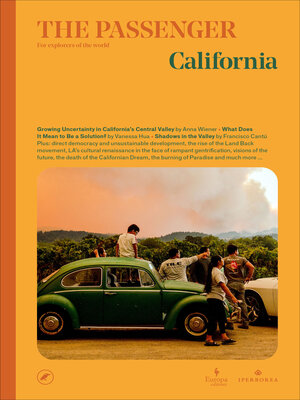
Sign up to save your library
With an OverDrive account, you can save your favorite libraries for at-a-glance information about availability. Find out more about OverDrive accounts.
Find this title in Libby, the library reading app by OverDrive.



Search for a digital library with this title
Title found at these libraries:
| Library Name | Distance |
|---|---|
| Loading... |
The best new writing, photography, art, and reportage from and about California—in the "rich and engrossing" series for travelers and armchair travelers (Times Literary Supplement).
From the Gold Rush to Hollywood's golden age to the rise of Silicon Valley, California has long stood as the brightest symbol of the American dream. In recent years, however, the country's mainstream media has been declaring with increasing frequency—and thinly veiled schadenfreude—the "end of California as we know it."
The pessimists point to rising inequality, racial tensions, and the impact of climate change as evidence that the Californian dream has been shattered. Between extreme heat, months-long droughts, devastating wildfires, and rising sea levels, looking at California is like watching the trailer for what awaits the world if we don't act to reduce global warming. Faced with these pressures, more and more Californians are leaving the state, leading to an unprecedented decline in population that could change the cultural and political balance of power in the country at large.
That said, demographic decline and climate disasters don't tell the whole story of one of the most dynamic and diverse states in the Union—one that continues to drive technological and political innovation and define the evolution of work, food, entertainment, and social relations. This volume offers a fascinating picture of California in all its complexity and contradictions—an attempt to understand the laboratory where much of the world's future continues to be written—with pieces including:
Growing Uncertainty in the Central Valley by Anna Wiener How Does It Feel to Be a Solution? by Vanessa Hua The Burning of Paradise by Mark Arax Plus: direct democracy and unsustainable development, the rise of the "land back" movement, the cultural renaissance of Los Angeles in defiance of rampant gentrification, and much more . . .
"The Passenger readers will find none of the typical travel guide sections on where to eat or what sights to see. Consider the books, rather, more like a literary vacation." —Publishers Weekly
From the Gold Rush to Hollywood's golden age to the rise of Silicon Valley, California has long stood as the brightest symbol of the American dream. In recent years, however, the country's mainstream media has been declaring with increasing frequency—and thinly veiled schadenfreude—the "end of California as we know it."
The pessimists point to rising inequality, racial tensions, and the impact of climate change as evidence that the Californian dream has been shattered. Between extreme heat, months-long droughts, devastating wildfires, and rising sea levels, looking at California is like watching the trailer for what awaits the world if we don't act to reduce global warming. Faced with these pressures, more and more Californians are leaving the state, leading to an unprecedented decline in population that could change the cultural and political balance of power in the country at large.
That said, demographic decline and climate disasters don't tell the whole story of one of the most dynamic and diverse states in the Union—one that continues to drive technological and political innovation and define the evolution of work, food, entertainment, and social relations. This volume offers a fascinating picture of California in all its complexity and contradictions—an attempt to understand the laboratory where much of the world's future continues to be written—with pieces including:
Growing Uncertainty in the Central Valley by Anna Wiener
"The Passenger readers will find none of the typical travel guide sections on where to eat or what sights to see. Consider the books, rather, more like a literary vacation." —Publishers Weekly







